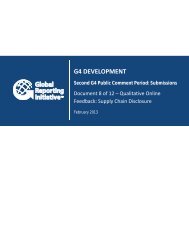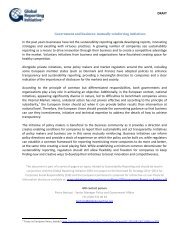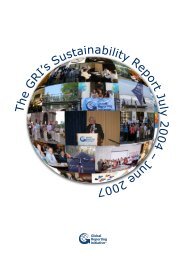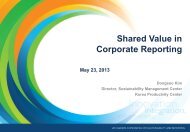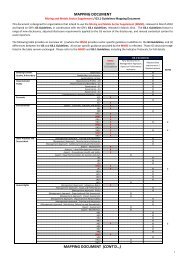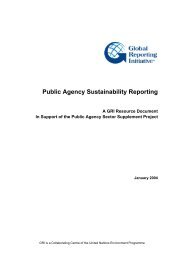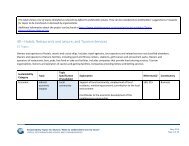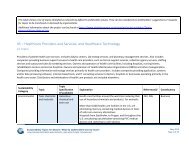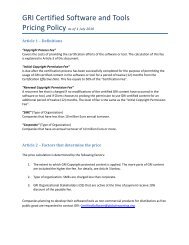CARROTS AND STICKS – PROMOTING ... - Global Reporting Initiative
CARROTS AND STICKS – PROMOTING ... - Global Reporting Initiative
CARROTS AND STICKS – PROMOTING ... - Global Reporting Initiative
You also want an ePaper? Increase the reach of your titles
YUMPU automatically turns print PDFs into web optimized ePapers that Google loves.
There is a large variety of regulatory<br />
choices. This variety depends on a<br />
lot of factors, including geopolitical<br />
factors. However, there are a few<br />
general trends to be discerned.<br />
With the publication of Carrots<br />
and Sticks for Starters in 2006,<br />
the debate was perhaps more<br />
about voluntary or mandatory<br />
reporting, although it had already<br />
been indicated that this was not<br />
an either/or debate. Explaining our<br />
title at the time, we noted that<br />
“the comprehensive sustainability<br />
reporting regulation debate is still<br />
young, the main course still has to<br />
be prepared”. Today the preparation<br />
of the main course is underway.<br />
In this new context today we can<br />
discern three emerging trends or<br />
developments.<br />
The first is a stronger role for<br />
the state and its regulatory role,<br />
to ensure a minimum level of<br />
disclosure and risk prevention. This<br />
was highlighted by Mervyn King,<br />
chairperson of the <strong>Global</strong> <strong>Reporting</strong><br />
<strong>Initiative</strong>, when he addressed the<br />
ESG disclosure workshop hosted<br />
by the European Commission in<br />
early 2010: “there is no time for<br />
a regulatory Business as Usual<br />
approach. After decades of voluntary<br />
laissez-faire reporting the time is<br />
ripe for stronger regulatory action<br />
and to follow the good examples<br />
of several EU governments who<br />
have introduced binding measures<br />
or legislation on ESG disclosure<br />
for some portion of their corporate<br />
sectors.”<br />
The second trend is an emerging<br />
emphasis on a combination of<br />
(complementary) voluntary and<br />
mandatory approaches.<br />
And the third emerging trend <strong>–</strong><br />
although in its infancy <strong>–</strong> is one<br />
of gradual integration, resulting<br />
in a combination of corporate<br />
governance, financial and<br />
sustainability reporting into one<br />
reporting framework. This third<br />
trend may be a reaction to avoid<br />
new financial scandals and crises.<br />
It is also a sign of the maturing<br />
field of sustainability reporting, and<br />
can contribute to achieving the<br />
transition to sustainable markets<br />
and economies. An important new<br />
initiative, which will help realise this<br />
emerging trend, is the establishment<br />
of the International Committee<br />
on Integrated <strong>Reporting</strong> (ICIR). Its<br />
purpose is to bring together the key<br />
standard setters of financial and<br />
ESG reporting and their principal<br />
stakeholders to plan and promote the<br />
transition to Integrated <strong>Reporting</strong>.<br />
Today and tomorrow’s debate on<br />
the future of sustainability reporting<br />
standards is focused on the following<br />
questions: (1) Whether and how<br />
to reach agreements on global or<br />
national reporting standards; (2) How<br />
regulation can speed up the pace<br />
of making relevant, accurate and<br />
comparable information available;<br />
(3) Whether sustainability reporting<br />
should become an integral part<br />
of financial reporting (integrated<br />
reporting); (4) Whether and how<br />
the current global sustainability<br />
and CSR frameworks be further<br />
aligned and consolidated, avoiding<br />
unnecessary overlap and confusion;<br />
(5) The meaning of “materiality”<br />
and linking backward-looking with<br />
forward-looking reporting; (6)<br />
How to take into consideration<br />
the different information needs of<br />
different groups (target audiences);<br />
(7) Whether a report is conceived<br />
as the only vehicle of disclosure;<br />
(8) Whether and what steps should<br />
be undertaken towards a generally<br />
accepted approach to assurance<br />
of sustainability reports; (9) The<br />
boundary of sustainability reporting<br />
(in particular supply and value chain).<br />
As mentioned above, a sense<br />
of “crisis” and “credibility” puts<br />
growing pressure on regulators<br />
world-wide to explore these<br />
questions more closely. One<br />
consideration is how regulation<br />
can speed up the pace of making<br />
relevant, accurate and comparable<br />
information available to address<br />
pressing societal challenges such<br />
as climate change and accountable<br />
business practice.<br />
Carrots and Sticks - Promoting Transparency and Sustainability<br />
Methodology<br />
Following the publication of<br />
Carrots and Sticks for Starters in<br />
2006, a core project team was<br />
formed in 2009 to oversee the<br />
revision process. In addition to the<br />
original partners, UNEP and KPMG<br />
Sustainability, the <strong>Global</strong> <strong>Reporting</strong><br />
<strong>Initiative</strong> and the Unit for Corporate<br />
Governance in Africa at the<br />
University of Stellenbosch Business<br />
School joined as partners.<br />
Core funding was provided by UNEP,<br />
but most project partners provided<br />
their services on a pro bono basis.<br />
Country practices from KPMG<br />
and GRI focal points performed<br />
the primary research and provided<br />
country information, while the core<br />
project team worked together on the<br />
analysis of data and development of<br />
content.<br />
A special advisory committee was<br />
convened by the GRI <strong>–</strong> this group<br />
of eminent persons provided input<br />
throughout the entire process. The<br />
names of the members of the<br />
advisory committee appear later<br />
in the document, but it should be<br />
emphasised that they have no<br />
responsibility for the content of the<br />
publication.<br />
9





